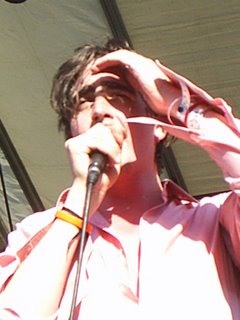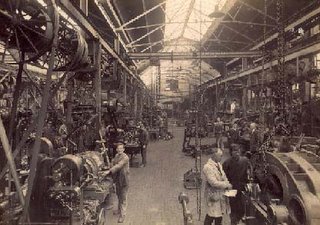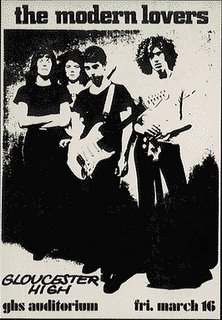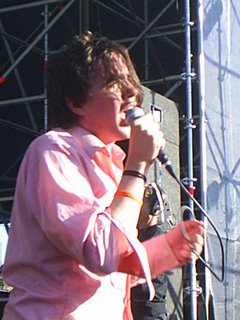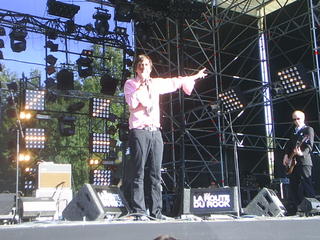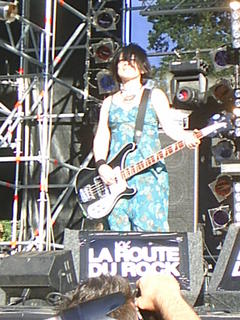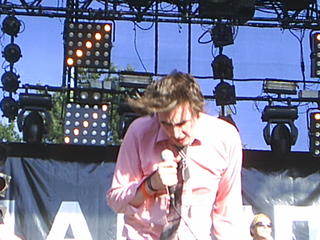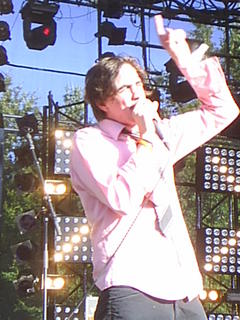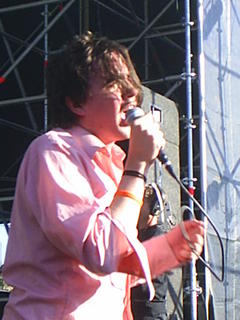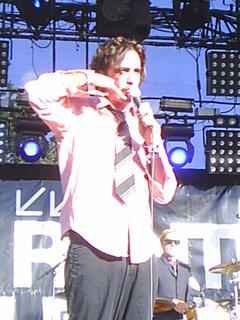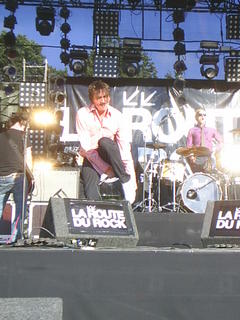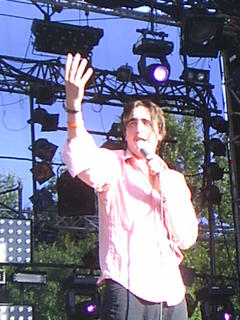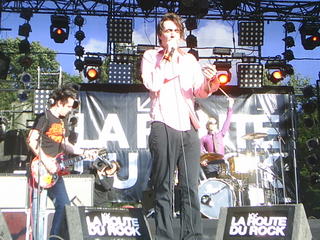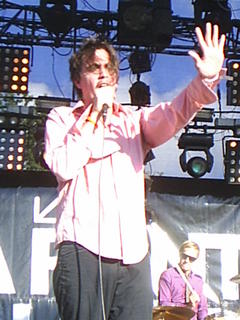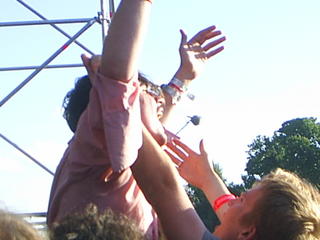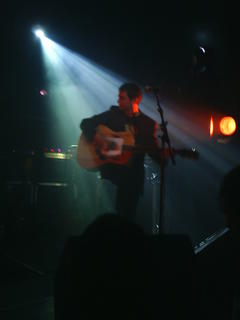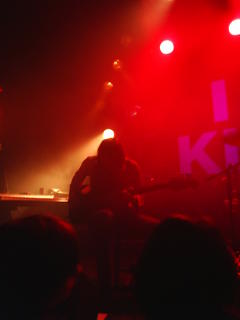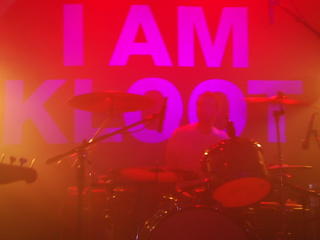THE BLUE VAN INTERVIEWI have read your biography. One day, I was listening to the radio and there was a Lou Reed and John Cale song called Small Town. It says: « when you growin up in a small town you say no one famous ever came from here. There is only one good use for a small town, you know that you wanna get out ». Could this song apply to the history of the band? You come from a small town too.Steffen: absolutely, that’s the feeling I had all along.
You have a different sound because you come from a small town.Allan: it’s because when you live in a small town, you don’t have other bands to look up to. So you just play what you want, and create your own sound.
Is music the bigger part of your life?The band: it is now.
Soren: we could have been truck drivers or prostitutes! (laughs)
How did you form the band? Do you know each other for a long time? Steffen: we grew up together. We met at the age of six with Soren.
Soren: we went to the same class. We were like the only two guys in the whole class who were into music at that point when you start getting into music in the fifth or sixth grade. And all the other boys were into farming, raising pigs and cows and stuff like this. We were the outsiders of the class. So we started playing together because there was no one else to play with. And luckily there was two more outsiders! Per could play the drums and Allan could play the bass. And then, that was a band!
How did you get into that sixties music? It is sometimes hard to find old records.Soren: when I was a kid there was this TV commercial, a coffee commercial where a guy played air guitar to a Jimi Hendix song. And I didn’t know who Jimi Hendrix was. I thought it sounded great. I found out it was Jimi Hendrix and I got a cd for Christmas. That’s how it started. Then you get into that sixties music, you discover other bands.
Allan: then you get addicted. And you spend all your money on records.
What does mean « Blue Van », is it a vehicle which collects the mentally ill to the hospital or is it taken from a song by an old danish beat orchestra Steppeulvene? The band: it is a mix of both.
Steffen: I think it was the new year’s eve, we were just hanging around, we heard the song and we just thought it could be a really good name for a band.
Soren: and we remembered what the blue van was from our History lessons, in school. Then we heard it in that song.
Steffen: and there was no discussion about it, everybody agreed.
Soren to Per: and that was at that new year’s eve you joined the band and I said « the band is called The Blue Van and you’re in! »
Per: and I thought what a fucking stupid name! (laughs)
Can you describe what you call beat music? Steffen: it’s a classic sense I think
Soren: it’s an expression that is not used anymore. Because I wouldn’t call our music garage music or rock and roll or stuff like that. I guess the main explanation on beat is back in the sixties when the Beatles and the Rolling Stones played blues music, they heard from the black musicians of America. And they called that beat music. And then I guess that’s what we do too we play music inspired by blues, its roots. I guess.
To sound live seems to be something really important to you. In your video for Revelation of Love, we see you record live. Steffen: just to be sincere. With the video we didn’t want some cheesy story, we wanted to show the band, to show a little bit of our energy we have when we perform live. It’s the same thing for the album. It’s a live sound, a natural sound. All the instruments are played together. It’s not drum and bass first and then guitar. It’s to get the unity of the band.
Soren: it’s the sound of a band. That’s what we miss today. All the bands are overproduced, with effects.
Steffen: it’s so strange sitting in a room, listening your friends play and try to play along. To me it’s unnatural to do that way.
I read that you liked the Kings of Leon album, A-Ha Shake Heatbreak. Do you think that now, bands like them have more freedom to sound like they want to sound?Steffen: yeah I think so. For many years record companies went to safe ways and produced the boring bands that might sell, mainstream bands.
Soren: I think it kind of changed with The White Stripes.
Steffen: there has been a change and it’s good for the music that we make. There’s nothing worse than being told to change our music and make it more friendly. It’s good that the success of The Strokes and The White Stripes changed things.
Allan: I think that people are trying to find a real band with members playing for a long time together.
Soren: I like The Beatles, they were a real band, and the Rolling Stones too. They were not put together by a record company like Boyzone or another boys band. It’s real. That’s the way it should be.
Steffen: and they play good music.
Is Roskilde Festival a good mean to know new danish bands? You played at Roskilde.
Steffen: they take a lot of the upcoming danish bands.
Soren: it’s like a milstone for upcoming bands. When we played there nobody knew us, we didn’t have any record deal . We played to 3000 people that day in Roskilde. And 3000 young people that’s quite a lot in Denmark, then they can spread the word.
Steffen: then these people came out to us in clubs and say « hey I saw you in Roskilde ».
Soren: a lot of people saw us for the first time in Roskilde.
Is it the first time you play in France? The band: yes and we hope it’s not the last.
You gave to some of your songs french titles like Coeur de lion ou Peine forte et dure. Do you like french language? Allan: it’s just a marketing plan! (laughs) We have some in german too!
Steffen: I’ve studied french in school, of course I forgot all about it now. We wanted other titles for songs instead of boring titles.
I’ve read the lyrics of your songs. They seem to stuck with the reality of our times. You talk about « rebels with a sound », that reminds Rebel without a cause, or « i’ll spit back at you »Steffen: the song I remember the days where there is that sentence, is a song about being an upcoming band, and people just look down on you and treat you like shit because you’re still underground so that’s just basically saying I’ll give you your shit back one day when I’m on top.
Is there some venues where bands like yours can play and become famous or is it difficult?
Allan: it’s hard, especially when you play the music that we play. In Denmark people only listen to pop music, hip hop, r’nb. They don’t dare to discover music like ours.
Soren: the number of people who are that type of music is so small.
Per: if the radios offered a large choice of bands, people would have the choice. Unfortunately, there is only one main radio channel.
Soren: they play one rock song an hour! And that‘s on the good days!
How do people react to your music? You have a very good reputation for a live band. The band: we get good reactions all places, every time.
Do you think that music and more particularly rock music can change things?
Steffen: music in general like painting or poetry are some means to give answers or to lead people to think in a different way. If they read the lyrics.
Soren: and dealing with the conservatism that’s still around in a lot of places. It’s amazing that I can walk down the street in my hometown and people can still yell something at me on a Saturday night, for having long hair! We’re in 2005! It’s like we were back to the 60’s!
Steffen: when they see us the outsiders feel less lonely.
Soren: it’s still like that in small cities.
There is some conservatism everywhere in Denmark?
Steffen: everywhere in the world. We just had the national elections last week and we got the conservatist government once again just like in the USA. Of course my lyrics are political but not too political. It wounds the music if it becomes too preaching. Look out a band like Rage Against The Machine, they had to split up because they had different political views.
Soren: it’s all about saying something between the lines.
It’s a good thing because sometimes listeners don’t like a too political music. Steffen: we played some times with another danish band whose first album was called Poems and Explosions. I think it’s a good definition of what our music is. It’s raw music with poetry.
Allan: unfortunately they got the title first!
You called your album the Art of Rolling, What does it mean? It reminds me of what Keith Richards said about Rock music. He sais that we always talk about the rock but never the roll! Steffen: I watched Soren roll cigarettes a lot.
Soren: no I finished them, but you did it best! We thought that The Art Of Rolling would be a pretty good title. Not only because it appeals to smokers!
Steffen: The Art of Rolling means also making good music, music that rolls. Music that rolls and rocks.
Soren: it’s the art of making good music.
Steffen: yeah and the art of making good music doesn’t sound as good!
When we go to your website we can see that you advice some artists and albums to listen.Soren: that’s to educate people (laughs). We are big record collectors too. Then you discover all sort of things. We are nerds in a way.
Steffen: nooo
Soren: it’s great if a kid goes to our page and see, listen to that record, he wouldn’t go out buy the new,
The band: Celine Dion!
Soren: that’s an achievement!
On your website you describe the gear you use. Are you trying to find a special sound with it? Steffen: finding the exact sound we want is important for us. And that way we educate people too!
Soren: we are music nerds and music gear nerds.
Allan: and we’re proud of it!
Do you collect instruments?Per: we don’t collect them. We use them.
But you seem to be proud to have found your organ. It makes your music different. Soren: exactly and I think it’s an overlooked instrument. Because rock bands are all about two guitars, bass and drums.
Steffen: nobody uses a real organ anymore. It’s always a keybord. In the ten years we played together we saw only one band that had a real organ.
Per: but it’s still in the background, behind the guitars. Instead of having two guitars we have an organ and a guitar.
Something more to say?The Band: visit our website and check out our favorite bands of the week!
